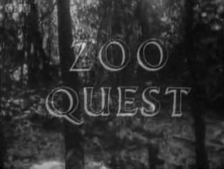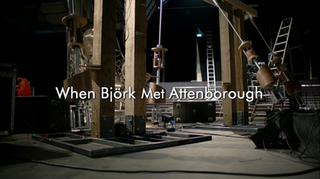
The Lewis and Clark Expedition, also known as the Corps of Discovery Expedition, was the United States expedition to cross the newly acquired western portion of the country after the Louisiana Purchase. The Corps of Discovery was a select group of U.S. Army and civilian volunteers under the command of Captain Meriwether Lewis and his close friend Second Lieutenant William Clark. Clark, along with 30 others, set out from Camp Dubois, Illinois, on May 14, 1804, met Lewis and ten other members of the group in St. Charles, Missouri, then went up the Missouri River. The expedition crossed the Continental Divide of the Americas near the Lemhi Pass, eventually coming to the Columbia River, and the Pacific Ocean in 1805. The return voyage began on March 23, 1806, at Fort Clatsop, Oregon, ending six months later on September 23 of that year.

Sir David Frederick Attenborough is a British broadcaster, biologist, natural historian, and writer. He is best known for writing and presenting, in conjunction with the BBC Studios Natural History Unit, the nine nature documentary series forming the Life collection, a comprehensive survey of animal and plant life on Earth.

Life on Earth: A Natural History by David Attenborough is a British television natural history series made by the BBC in association with Warner Bros. Television and Reiner Moritz Productions. It was transmitted in the UK from 16 January 1979.
U&Eden is a British free-to-air channel broadcasting nature content with some factual entertainment programming in the United Kingdom and Ireland as part of the UKTV network of channels. The channel originally launched on 8 March 2004 and relaunched in its current format on 27 January 2009. U&Eden was a pay television channel until 2024.

Life in Cold Blood is a BBC nature documentary series written and presented by David Attenborough, first broadcast in the United Kingdom from 4 February 2008 on BBC One.

Zaglossus attenboroughi, also known as Attenborough's long-beaked echidna or locally as Payangko, is one of three species from the genus Zaglossus that inhabits the island of New Guinea. It lives in the Cyclops Mountains, which are near the cities of Sentani and Jayapura in the Indonesian province of Papua. It is named in honour of naturalist Sir David Attenborough.

A nature documentary or wildlife documentary is a genre of documentary film or series about animals, plants, or other non-human living creatures. Nature documentaries usually concentrate on video taken in the subject's natural habitat, but often including footage of trained and captive animals, too. Sometimes they are about wildlife or ecosystems in relationship to human beings. Such programmes are most frequently made for television, particularly for public broadcasting channels, but some are also made for the cinema. The proliferation of this genre occurred almost simultaneously alongside the production of similar television series which is distributed across the world.

Zoo Quest is a series of multi-part nature documentaries broadcast on the BBC Television Service between 1954 and 1963. It was the first major programme to feature David Attenborough.

The Lost World is a 2001 British made-for-television film adaptation of the 1912 novel of the same name by Arthur Conan Doyle, directed by Stuart Orme and adapted by Tony Mulholland and Adrian Hodges. It was filmed at various locations on the West Coast of New Zealand. The 145-minute film was divided into two 75-minute episodes when broadcast on BBC One on 25 and 26 December 2001, receiving 8.68 million and 6.98 million viewers respectively. Bob Hoskins played Professor Challenger and was supported by James Fox, Peter Falk, Matthew Rhys, Tom Ward and Elaine Cassidy.
The Panará are an Indigenous people of Mato Grosso in the Brazilian Amazon. They farm and are hunter-gatherers.
Attenborough in Paradise and Other Personal Voyages is a DVD collection of seven David Attenborough BBC documentary specials.
Attenborough in Paradise is a BBC television documentary written and presented by David Attenborough. It was first transmitted in 1996 and is part of the Attenborough in Paradise and Other Personal Voyages collection of seven documentaries.
The Tribal Eye is a seven-part BBC documentary series on the subject of tribal art, written and presented by David Attenborough. It was first transmitted in 1975.

Life is a British nature documentary series created and produced as a co-production between the BBC Natural History Unit, Discovery Channel and Skai tv in association with The Open University. It was first broadcast as part of the BBC's Darwin Season on BBC One and BBC HD from October to December 2009 and was written and narrated by David Attenborough. The series takes a global view of the specialised strategies and extreme behaviour that living things have developed in order to survive; what Charles Darwin termed "the struggle for existence". Four years in the making, the series was shot entirely in high definition.
The following is a chronological list of television series and individual programmes in which Sir David Attenborough is credited as a writer, presenter, narrator, producer, interviewee, or other role. In a career spanning eight decades, Attenborough's name has become synonymous with the natural history programmes produced by the BBC Natural History Unit.
Christopher Eugene Parsons OBE was an English wildlife film-maker and the executive producer of David Attenborough's Life on Earth nature documentary. As a founding member and a former Head of the BBC Natural History Unit, he worked on many of its early productions and published a history of its first 25 years in 1982. Besides television, he was also passionate about projects which helped to bring an understanding of the natural world to a wider audience, notably the Wildscreen Festival and ARKive.
Ambunti is a town in Ambunti-Dreikikier District of East Sepik Province in Papua New Guinea. It has a population of 2,110.
Kwoma is a Sepik language of Papua New Guinea also known as Washkuk. The word 'Kwoma' means "hill people". Washkuk is a government name for the people of Kwoma. Linguists have the given the name 'Kwoma' as the primary name of the language, but 'Nukuma' is the specific name for the Northern dialect. Nukuma means people who live along the upper reaches of the Sanchi River. The speakers of Kwoma are located in the Ambunti district of the Sepik River region. There are two dialects known as Kwoma (Washkuk) and Nukuma. The Kwoma dialect or "hill people" is located in the Washkuk Hills which is a range of mountains on the north side of the Sepik. The Nukuma dialect or "headwater people" live to the north and west of the Washkuk range along the Sepik River. Kwoma is considered an endangered language with an estimated 2,925 native speakers worldwide.
Attenborough: 60 Years in the Wild is a three-part BBC documentary series chronicling the 60 years career making wildlife programmes of Sir David Attenborough. The first hour-long programme, titled "Life on Camera" was broadcast on Friday 16 November 2012 on BBC Two at 9pm. The second part, "Understanding the Natural World" and third and final part, "Our Fragile Planet" were broadcast on following Fridays, 23 and 30 November 2012.

When Björk Met Attenborough is a 2013 documentary television film directed by Louise Hooper, executive produced by Lucas Ochoa and produced by Caroline Page. It was aired for the first time on 27 July 2013 on Channel 4, in conjunction with Pulse Films and One Little Indian Records. Partly filmed at the Natural History Museum in London, the documentary features an encounter between Icelandic singer-songwriter and musician Björk and English broadcaster and naturalist David Attenborough. They discuss the nature of music and the intersection between music, nature and technology. It also follows the singer as she prepares for her Biophilia tour, along with rehearsal and studio recording.









